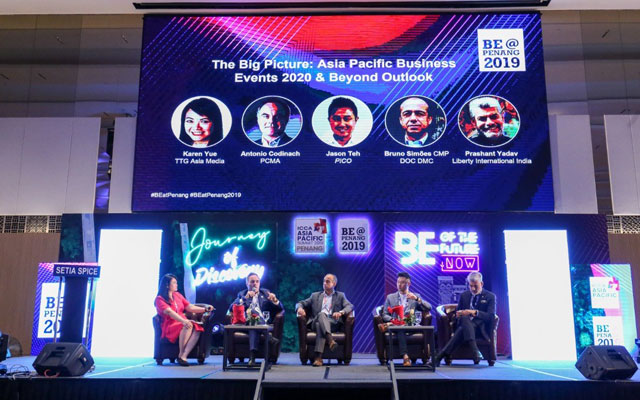Asian business event leaders are remaining positive about 2020 despite the global economic slowdown, saying that an ability to adapt quickly to challenges and see opportunities in obstacles will tide businesses through.
- Calendar of mega events indicative of continued business confidence in 2020
- Business adaptability will enable event players to come up victorious
- Collaboration is key to survival

Asian business event leaders are remaining positive about 2020 despite the global economic slowdown, saying that an ability to adapt quickly to challenges and see opportunities in obstacles will tide businesses through.
These leaders were on a four-person panel session, The Big Picture: Asia Pacific Business Events 2020 & Beyond Outlook, at last week’s BE@Penang annual conference organised by Penang Convention & Exhibition Bureau.
Speaker Antonio Codinach, regional business director Asia Pacific, at Professional Convention Management Association (PCMA), encouraged optimism among his industry peers, saying: “We all in this room should feel honoured and lucky. We are the most agile, fastest-growing region in the world. This is also a region that is the most stable and where opportunities are.”
Codinach said one’s attitude will shape one’s reaction to the projected future. “How our attitude is towards (the future) is important. So, I choose to see the future with positive eyes. We need to be agile and adaptable to changes, and make a commitment to the industry or the destination we represent.”
Also upbeat about the future is Bruno Simões, managing director of DOC DMC Macau & Hong Kong, despite describing his business as being “in a situation” now, hurt by the social unrest in Hong Kong and soft event spend in major market China which is “locked in a trade stand-off with the US”.
His confidence is fuelled by his observation that “most corporate clients are ready for events and many professional associations are ready to grow (in this region)”.
Simões added: “Across the years, Asia’s business events industry has proven to be (strong in the face of technology disruption) and crisis-resilient. In the case of Hong Kong, I’m sure she will recover very quickly, as she has done in previous crises.”
Pointing to the calendar of mega events taking place around the world in 2020 and which Pico Group is involved in, Jason Teh, managing director of Pico Malaysia, also expressed positivity in the year ahead.
“We are also seeing that most of our corporate clients are spending a bit more in the coming months. Business events is part of marketing, which is a business activity that will go on no matter the state of the economy. When business is bad, marketing is even more essential,” explained Teh.
When asked by panel moderator, Karen Yue, group editor of TTG Asia Media and title editor of TTGmice and TTGassociations, how were business leaders planning to ride through the tough times, speakers were unanimous is the belief that the ability to turn a challenge into an opportunity will allow businesses to come up victorious.
Citing an example, Prashant Yadav, CEO, Liberty International India, said his company – which typically delivers outbound Indian events – moved swiftly to support Indian companies that have chosen to keep their events on home ground against a backdrop of a soft Indian economic growth.
“Many business events did not leave the country this year (due to budget constraints) and stayed in India instead. At least five companies that usually do annual incentives for 600 to 1,000 people to longhaul destinations such as Europe, have chosen to stay in the country. We turned the reluctance to leave India into a business opportunity for us and for India,” shared Yadav.
He added that some clients were also quick to capitalise on destinations in turmoil, when tourism products are offered at the best value for money. Yadav said Asians, used to the diverse and dynamic conditions of this region, are masters of adaptability.
For Simões, a business slowdown presents the opportunity to “do things we never had time to do because work in events is intensive”.
“So, now is the time for us to sharpen our weapons. There are constant challenges to business – technology disruption, talent crunch, etc. When you are busy delivering events, you barely have time to stop and think about how to deal with these problems. This is now the best time to stop, look at what competitors and peers are doing, draw up an agenda to take the business forward, and learn,” he elaborated.
Additional reporting by S Puvaneswary





















